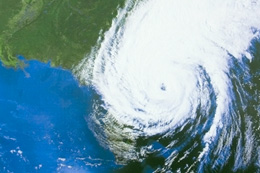Hurricanes: Be Prepared!
 The New Bedford and Southcoast area is vulnerable to strong winds from tropical storms and hurricanes as they approach unabated from the south. With an approaching hurricane or tropical storm, there are many easy steps a homeowner can take to minimize the damage that can occur from strong winds and heavy rain. Here are a few points:
The New Bedford and Southcoast area is vulnerable to strong winds from tropical storms and hurricanes as they approach unabated from the south. With an approaching hurricane or tropical storm, there are many easy steps a homeowner can take to minimize the damage that can occur from strong winds and heavy rain. Here are a few points:
- Create or review a disaster plan. Plan an evacuation route in advance and determine where you will go if told to evacuate.
- Prepare a survival kit. Stock up on drinking water, non-perishable food, a first-aid kit and medicine for everyone including your pet. Include extra clothing, blankets, batteries, flashlights, a portable radio and cash.
- Secure outdoor objects such as garbage cans and lawn furniture.
- Review how to shut off utilities in an emergency.
- During a heavy storm, power off and unplug electronics and appliances.
- Locate important papers and documents, including your insurance policy and have them ready to take with you should you need to evacuate.
- Leave promptly if ordered to evacuate.
- Heavy rains have the potential to cause significant damage. Remember to:
- Close and lock all windows and doors.
- Remove window air conditioners.
- Remove valuable items from your basement.
- If it’s not possible or practical to move some items, elevate them off the floor on pallets or concrete blocks.
- Clear exterior drains.
- Look for exterior drains at the bottom of basement stairs, in window wells, and anywhere sidewalks or driveways slope toward the foundation.
- Clear gutters of leaves and debris.
- This is also a good time to repair any damaged gutters.
- Make sure water can drain away from your foundation.
- Check that your downspouts have elbows and splash blocks to direct water away from the house.
- Check your sump pump.
- Pour water into the sump and verify that the pump is working properly. If it has a battery backup, test the battery backup by switching off the main power to the house at the circuit breaker.
Take extra precautions with portable generators.
- Generators should be properly grounded and should never be operated indoors, in garages, basements or near windows or doors.
- Since generators produce carbon monoxide (CO), make sure you have working CO detector in your home.
- Never plug a generator into a wall outlet, which can “backfeed” into your home’s electrical system and endanger utility workers or anyone who comes near downed wires.
- Store generator fuel in an approved can away from the house, open flames and fuel-burning appliances such as natural gas appliances.